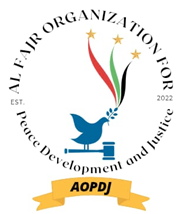Geneva / September 10th 2025
The Fajr Organization for Peace, Development, and Justice seizes the opportunity of the 60th session of the Human Rights Council, which began on 8 September 2025, to shed light on the catastrophic human rights situation in Sudan, where civilians continue to endure systematic and grave violations amounting to war crimes and crimes against humanity, committed by all parties to the conflict without exception.
In Al-Jazirah State – the Kanabi area – local sources and independent organizations have documented the burning of more than 160 villages, along with extrajudicial killings, arbitrary arrests, and enforced disappearances. The so-called “Strange Faces Law,” imposed by the Sudanese Armed Forces, has been exploited as a pretext to target civilians based on identity, resulting in summary executions and sham trials lacking the most basic guarantees of justice.
In Kuma, Mellit, Tura, and Abu Zabad, the Sudanese Air Force launched attacks on residential neighborhoods, killing dozens – most of them women and children. These acts constitute a flagrant violation of the principle of distinction and the prohibition on targeting civilians under international humanitarian law.
The crisis has been further aggravated by the proliferation of militias across Sudan. Among the most notorious are the extremist Al-Baraa Battalions, along with other groups allied with the army or claiming neutrality. These forces have been involved in killings, looting, and widespread sexual violence against civilians.
Regional interventions have further complicated the conflict. Reports indicate that Eritrea has established forced conscription camps and sent fighters into Sudan. In addition, there are accounts of Tigrayan and Eritrean groups fighting alongside the Sudanese army. These interventions not only fuel the conflict but also widen the scope of violations.
Credible testimonies reveal that women and girls have been coerced into providing sexual services in exchange for food or protection. Such crimes constitute war crimes and crimes against humanity, systematically targeting the most vulnerable groups.
Allegations, supported by reports, of the use of chemical weapons on the battlefield are increasing. Experts and international officials have expressed grave concern, stressing the urgent need for an independent international investigation to establish the facts and ensure accountability.
At the same time, millions of internally displaced persons face a suffocating blockade and deliberate obstruction of humanitarian aid. In some cases, they have been used as “human shields” – in blatant violation of the Geneva Conventions.
Sudanese refugees are also subjected to additional abuses beyond Sudan’s borders. In Egypt, they face forced deportation to Port Sudan, where they risk enforced disappearance. In Uganda and Libya, Sudanese diplomatic missions have engaged in repressive practices, including assassinations and arbitrary arrests. The most shocking case was the abduction of young activist Mohamed Adam (known as “Tupac”) from inside the Sudanese embassy in Tripoli.
The so-called “de facto government” in Port Sudan does not represent the Sudanese people. Rather, it provides political cover for the return of the ousted Omar al-Bashir regime, led by the Islamist movement that still dominates the army. This movement bears direct responsibility for fueling wars and undermining peace efforts. Any recognition of this government will only prolong the suffering of the Sudanese people and undermine prospects for a just solution.
Therefore, we urge this Council to:
1. Establish an independent international mechanism to investigate all violations, including the use of chemical weapons.
2. Reject any attempt to legitimize the de facto government in Port Sudan, which does not reflect the will of the Sudanese people.
3. Press all armed parties, including allied militias, to comply with international humanitarian law.
4. Provide urgent and effective protection for internally displaced persons and Sudanese refugees, ensuring they are not subjected to refoulement.
5. Renew and strengthen the mandate of the Fact-Finding Mission, equipping it with sufficient resources to collect and verify information from primary sources in line with the highest professional standards.
6. Ensure accountability and end impunity by referring violations to international justice.
The tragedy unfolding in Sudan is not merely an internal matter; it is a test of the credibility of the international human rights system itself. Silence from the international community will be interpreted only as a green light for atrocities to continue. The Sudanese people deserve peace, justice, and dignity.
